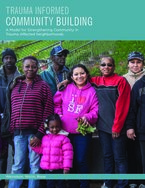Found 20 resources.
0
0
0

Housing is a complex domain. Solutions that repair our broken housing system will require a collaborative approach to funding and long-term systems change.
Topics: COVID-19, Funding, Housing, Racial inequalities
 Shared by Sandra Ware
on Jan 3, 2023
Shared by Sandra Ware
on Jan 3, 2023 0
0
0

How a national funder collaborative is empowering communities, expanding access to housing in BIPOC neighborhoods, and changing policies, narratives, and systems that perpetuate racial injustice.
Topics: Funding, Housing, Legislation & Policy, Racial inequalities
 Shared by Sandra Ware
on Jan 3, 2023
Shared by Sandra Ware
on Jan 3, 2023 0
0
0

Is the future of philanthropy a more collaborative one? The leaders of Funders for Housing and Opportunity share lessons to help the field learn—and evolve—in real time.
Topics: Community development, Funding, Housing, Legislation & Policy, Racial inequalities
 Shared by Sandra Ware
on Jan 3, 2023
Shared by Sandra Ware
on Jan 3, 2023 0
0
0

Three social change leaders discuss how to move the narrative about housing away from a focus on individual actions toward values, racial justice, and the well-being of all.
Topics: Housing, Legislation & Policy, Racial inequalities
 Shared by Sandra Ware
on Jan 3, 2023
Shared by Sandra Ware
on Jan 3, 2023 0
0
0

To solve the housing crisis, funders must take collective action to simultaneously solve the climate crisis and prioritize those who have had the least to do with creating either.
Topics: Advocacy, Environmental Resiliency/Climate Change, Green, Housing, Lead, Low-income, Racial inequalities
 Shared by Sandra Ware
on Jan 3, 2023
Shared by Sandra Ware
on Jan 3, 2023 0
0
0

Two housing justice advocates discuss different approaches to policy change and the importance of centering the voices of people most affected by systemic barriers and inequities in housing.
Topics: Advocacy, Housing, Legislation & Policy, Low-income, Racial inequalities
 Shared by Sandra Ware
on Jan 3, 2023
Shared by Sandra Ware
on Jan 3, 2023 0
0
0

Local initiatives are breaking new ground to make access to housing and opportunity more affordable and equitable and to increase the resources dedicated to housing justice.
Topics: Community development, Housing, Legislation & Policy, Partnerships, Racial inequalities
 Shared by Sandra Ware
on Jan 3, 2023
Shared by Sandra Ware
on Jan 3, 2023 0
0
0

In the newly released Stanford Social Innovation Review article, co-authors Jessica Mulcahy, Success Measures at NeighborWorks America; Vedette R. Gavin, Verge Impact Partners; and Stacey Barbas and Kate McLaughlin, The Kresge Foundation discuss their collaborative work on a three-year developmental evaluation to learn about the strategies and approaches grantees are using to advance health equity through housing. This article is part of the series “Collaboration for Housing Justice” sponsored by Funders for Housing and Opportunity to mark their fifth anniversary.
Topics: Community development, Health, Housing, Place-based, Racial inequalities, Research
 Shared by Camille Anoll-Hunter
on Dec 15, 2022
Shared by Camille Anoll-Hunter
on Dec 15, 2022 0
0
0
Zoning rules dictate more than just how we can use and build on land. They also shape our communities and our lives. Land use laws determine where we can find housing, schools, and parks—and who has access to them.
Topics: Health, Housing, Legislation & Policy, Racial inequalities
 Shared by Housing Is
on Jun 13, 2019
Shared by Housing Is
on Jun 13, 2019 0
0
0
African-Americans are three times more likely to die from asthma as whites. In Philadelphia and elsewhere, how can outcomes improve with changes to housing quality and pollution control?
Topics: Asthma, Health, Housing, Low-income, Racial inequalities
 Shared by Housing Is
on May 23, 2019
Shared by Housing Is
on May 23, 2019 0
0
0
Housing is at the epicenter of all opportunities and outcomes. It is the first rung on the ladder to economic opportunity, and a person’s access to opportunity is linked with that of their community. From health, to economic mobility, to educational opportunity, to racial equity, and beyond, housing shapes families and communities.
Topics: Asset building, Education, Health, Homelessness, Housing, Low-income, Mobility, Racial inequalities
 Shared by Housing Is
on Mar 28, 2019
Shared by Housing Is
on Mar 28, 2019 0
0
0
Last month, the Los Angeles County Board of Supervisors voted unanimously to dedicate $5 million to preventing housing discrimination and to develop an ordinance to protect housing choice voucher holders from source of income discrimination. The supervisors have until May to draft the ordinance’s language and have not yet developed a timeline for enacting it, but these actions are a step toward expanding voucher holders’ housing options.
Topics: Housing, Legislation & Policy, Low-income, Racial inequalities, West Coast
 Shared by Housing Is
on Mar 13, 2019
Shared by Housing Is
on Mar 13, 2019 0
0
0
As a result of decades of legalized discrimination in the housing industry, huge racial disparities in homeownership still exist today. This is not acceptable in a country founded on equal opportunity. Nationally, 72 percent of white households own a home, compared to only 42 percent of black households and 46 percent of Hispanic households. Homes typically make up the largest portion of a family’s overall wealth, so these disparities in homeownership are the most significant factor in the racial wealth gap.
Topics: Asset building, Housing, Legislation & Policy, Racial inequalities
 Shared by Housing Is
on Mar 11, 2019
Shared by Housing Is
on Mar 11, 2019 0
0
0
We can imagine a future where everyone can find and afford a quality home. Where every neighborhood offers a diversity of housing options. And where people up and down the income ladder can enjoy housing security and build wealth through ownership. Achieving this vision requires more than incremental tinkering with today’s market institutions and public policies. It requires bold innovation by changemakers at all levels of government and in the private and nonprofit sectors.
Topics: Housing, Legislation & Policy, Mobility, Racial inequalities, Research
 Shared by Housing Is
on Feb 21, 2019
Shared by Housing Is
on Feb 21, 2019 0
0
0
Affordable housing campaigns are not new, of course, but what is unprecedented and transformative about Opportunity Starts at Home is the scope and diversity of the partners that are joining forces to advocate for more robust and equitable federal housing policies. The campaign is advised by a Steering Committee including leading national organizations representing a wide range of interests that are working shoulder-to-shoulder to solve the affordable housing crisis.
Topics: Asset building, Child welfare, CLPHA, Community development, Early childhood, Education, Food insecurity, Funding, Health, Homelessness, Housing, Immigrants, Legislation & Policy, Low-income, Mobility, Out-of-school time, Partnerships, Racial inequalities, Safety, Seniors, Stability, Substance abuse, Youth
0
0
0
"Residential segregation is at the heart of racial inequality in the country. All of the disparities in the U.S. — in education, in income, wealth, employment, health — between the races are all fundamentally linked to residential segregation. There’s no real way to deal with disparities between black and white people without dealing with this."
Topics: Housing, Low-income, Partnerships, Racial inequalities, Research
0
0
0
Homeownership often translates to wealth accumulation, and wealth grows generationally. As a result, the wealth gap between white and black families has grown over the past 50 years. In 2016, white wealth was seven times greater than black wealth. Even if black families own homes, home equity does not necessarily provide the same savings and wealth-building opportunity as it does for white families.
Topics: Housing, Legislation & Policy, Racial inequalities, Research
0
0
0

On September 20, 2018, a panel of researchers and practitioners discussed new research and ongoing challenges associated with the HCV program at HUD’s Quarterly Update from the Office of Policy Development and Research.
Topics: Housing, Legislation & Policy, Low-income, Mobility, Racial inequalities, Research
0
1
1
Neighborhoods are constantly changing as residents come and go, businesses open and close, and properties go up or come down. No place is the same for long. When community changes are widespread or stark, the conversation shifts from change to “gentrification,” the definition of which is often subject to debate. At its heart, gentrification happens when a low-income area that has experienced disinvestment attracts new economic investments and higher-income residents. But the benefits of these changes can be overshadowed by the perpetuation of disadvantage.
Topics: Community development, Housing, Low-income, Mobility, Racial inequalities
0
0
0
Trauma is a set of normal human responses to stressful and threatening experiences (National Center for PTSD, 2007). Low-income and public housing residents may experience cumulative trauma resulting from daily stressors of violence and concentrated poverty, as well as historic and structural conditions of racism and disenfranchisement. We present a model of Trauma Informed Community Building (TICB) that addresses the challenges trauma poses to traditional community building strategies. TICB strategies de-escalate chaos and stress, build social cohesion and foster community resiliency over...
Topics: Community development, Housing, Low-income, Mental health, Racial inequalities
 Shared by Housing Is
on Aug 9, 2018
Shared by Housing Is
on Aug 9, 2018 
